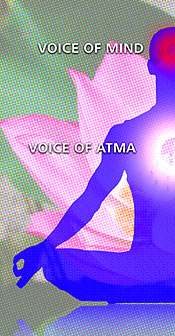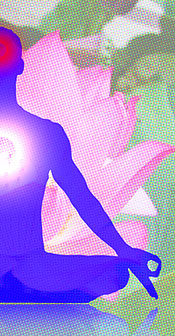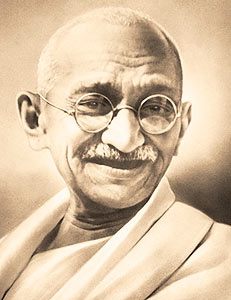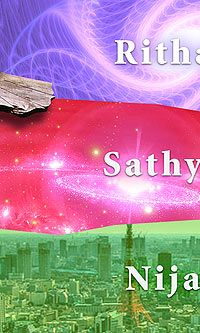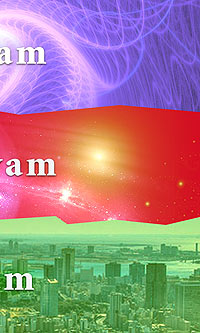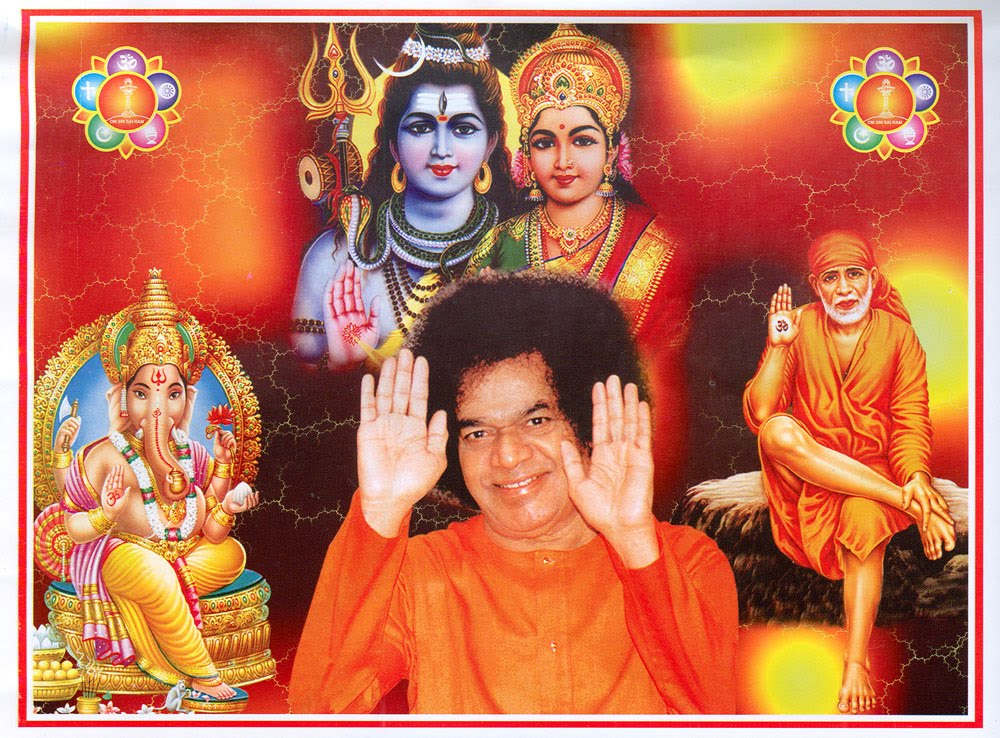spiritual questions and answers PART 9 (Continued from the previous issue) By Prof. G. Venkataraman | ||
We have now meticulously compiled and categorised these questions, and Prof. G. Venkataraman has offered to answer all these queries in a structured and systematic way as a series on Radio Sai as well as in H2H. In this way, these answers now remain always on our website as a ready reckoner on spiritual doubts.This is a suitably adapted transcript of our radio series bearing the same name. To listen or download the talk from our website, please visit www.radiosai.org/qa
Loving Sai Ram and greetings from Prashanti Nilayam. It is nice to be with you once more, responding to your questions. I have two questions before me today, and as earlier, these two questions also relate, in a manner of speaking, to the subject: purpose of life; if you recall, that is the topic we are currently dealing with.
The questions I shall be dealing with today are as follows:
QUESTION 1:
Does being selfish prevent one from being Self-realised?
Does being selfish prevent one from being Self-realised?
QUESTION 2:
Is it possible to obtain liberation in spite of being an atheist, but good at heart?
Is it possible to obtain liberation in spite of being an atheist, but good at heart?
Without appearing to hurt the questioner, I would say the first question is like asking: “Can we have the cake and eat it too?” I am afraid not. The question arises because of a basic ignorance about what Self-realisation is really all about. Once one gets some understanding of that, many such questions would automatically fade away. So, let me spend some time going over this Self-realisation process.
I have of course gone over this already in earlier articles, but then, in a series like this, a certain amount of repetition is inevitable. Rather than complain about it, I look upon it not only as a chance to do some revision, but also as an opportunity for injecting a few new angles. So, those of you who might tend to feel it is all the “same old stuff”, please bear with me! We have many readers for this series and we have to take everyone along with us as we journey forward. With that caveat, let me address the first question.
I shall try to deal with the question by focussing first on three key words, namely, the Self, Self-realisation, and selfishness. Once I explain what these three words mean, the answer to the question would be almost self-evident.
Although this might appear to be like a diversion, let me start with the familiar question: “Who am I?” Most of the time, this question is asked in a purely worldly sense, and it needs therefore to be answered also in that very same sense. Thus, almost everyone responds by saying, “I am so and so,” and at times offers further information by identifying one’s family, hometown, job title, etc. These days, all this is done most efficiently by simply offering a business card that includes many details that would be needed by most questioners.
All this refers to usual worldly business, but when the same question is asked in Spirituality, it has an entirely different connotation. There, when one asks ‘who am I?’ one is really asking: “What exactly is the core of my personality? What precisely is my True Nature?” One might be puzzled as to why at all does such a question arise in the first place.
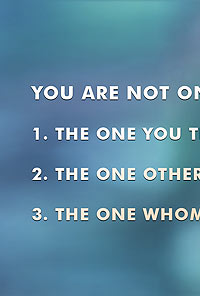 | 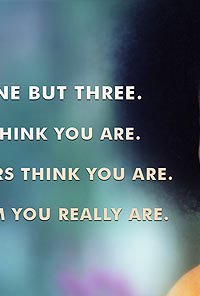 | 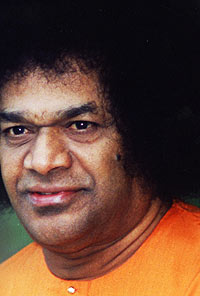 |
The reason for that is that every human being is actually a composite of three distinct entities:
1. the gross body,2. the Subtle Mind, and3. the Cause of everything in the Creation,
namely the Atma,
that goes beyond Space and Time itself.
From this perspective, the question Who am I? can be rephrased as: “Am I the body, or am I the Mind, or am I the Atma? Which of these three am I?”
Who Are We Really
Commenting on these three questions, Swami says: “You think you are the body, but you are not the body.” OK, does that mean we are the Mind? Swami’s answer to that is: “Others judge you by your behaviour and attitude and since these are shaped largely by the Mind, it essentially means that others think you are the Mind. But that also is not true!”
So two out of the three possibilities have been knocked out, and by the process of elimination, it follows that the answer to the question ‘Who am I?’ obviously has to be, “I am the Atma.” Indeed that is exactly right, and Swami also confirms it emphatically. So, we are not the body, we are not the Mind but the Atma – that is settled.
Now you may say: “Listen, the question you are supposed to answer is entirely different. It is: “Does being selfish prevent one from achieving Self realisation?” What has all that you have just now said got to do with that question?” Everything, as I shall now explain. The first step consists in understanding that the Atma is incapable of selfishness.
To put it differently, the Atma can never suggest an action that has even a trace of selfishness in it. Hence, if a person tends to feel selfish, it means some agency within, other than the Atma is prompting him or her to be selfish; and it turns out that this other agency is nothing but the Mind.
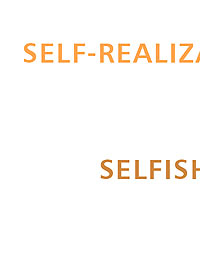 | 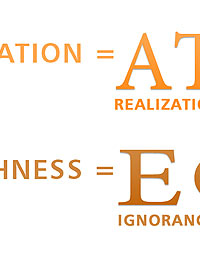 | 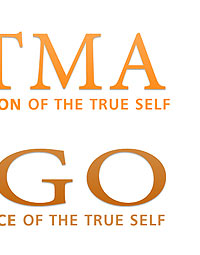 |
You might now say: “OK, the Mind prompts selfish ideas; so what? What has that got to do with Self-realisation?” Well, in order to figure that one out, let us first ask what does the word Self-realisation mean? It means knowing and believing that one is actually the Atma and not the Mind. In addition, one must feel as well as act in the true Spirit of the Atma – that is what Self-realisation is all about. Now tell me, how can a person be selfish and yet claim he is acting in the Spirit of the Atma? Are not the two things contradictory? I hope you get the point.
I might take the opportunity to add a few clarifying remarks that are related to the advice we seek within. You see there are two agencies within us, both of which are capable of giving a reply when you post a question inside. Let us say a person wants to do something and wants some advice.
So, he asks himself: “Should I do this or should I not?” This is a question that is asked of one self and one expects a reply. This assumes or implies that there is an agency within that could be called the “self” that is supposed to give the answer. What is that agency within that could be called the “self”?
The Tale of the Two Selves
Let us try to deal with this question. Vedanta says that there are two agencies within that could claim to be the “self”; one is the Atma and the other is the Mind. Of these two, the Atma is the Real or the True Self; as for the Mind, being extra-ordinarily clever and powerful, it all the time keeps on making the claim, “I am the Self!” though it is not; in fact it is the bogus or the false self.
Thus, every time humans look inside for clarity and guidance, they hear two voices, both giving advice. If the person is spiritually ignorant, then the person would not know which voice one must pay attention to and which voice one must ignore; in other words, the person is unable to distinguish the true from the false – that is the problem.
| |||
The voice of mind and the voice of Atma present two different points of view; we choose which one to listen to |
These two voices present different points of view and both argue their cases strongly; and the poor individual who is facing a difficulty and wants guidance from within, is totally lost. He or she does not know which of the two voices is giving the right answer, and how exactly to make sure one is getting the right answer and is not being taken for a ride. Interestingly, this precisely is what the Bhagavad Gita is all about.
Remember what happens right in the beginning of the Gita? Arjuna asks Krishna, his Charioteer, to take the chariot to the middle-ground from where he could survey both armies. Krishna does that because He knows fully well what is going to come. When they reach the middle ground and Arjuna is able to see both armies in full, both in battle-readiness and fully prepared to slaughter each other when the word “go’ is given, Arjuna is suddenly seized with all kinds of doubts. He then reflects and seeks answers from inside, which he then conveys to Krishna.
Krishna smiles and then tells Arjuna, “Look mister, you have been conned! The personality within you that is giving this advice, that seems so reasonable is actually a fake, a fraud; it is nothing but your Ego, posing as your Real Self. You had better acquire some Spiritual Discrimination or Buddhi immediately; otherwise, this very clever salesman inside would be constantly selling you lemons. Wake up and grow up; don’t remain a sitting duck for ever!” And that is when God, speaking from outside, gives a powerful lesson on how God advises constantly from inside as the Indweller and how one must learn to tune into Him.
What we learn from all this is the following: When we tune inside for advice on how to act when faced with a sticky situation – and that is what Arjuna faced, to fight or not to fight – we would encounter two voices; one of them would be Real and the other would be an utter fake, which, however, would try to appear very genuine. The Real Voice is that of the Atma, while the other one comes from the Mind; one is true and the other is false.
Recognising the Real from the False
The question now becomes how to distinguish between the two. This is rather like the old story where two women appear before a judge, both claiming that the baby before them is theirs. You might have heard of that one before. Well what happens is that the judge creates a situation and sees how the two women react, and from their different reactions, he is able to find out which one is the real mother and which one is the fake.
All that is fine but what do we do in the present case, which has to do with spirituality? Luckily, Swami has given us the complete procedure, and all I have to do is to repeat it for you. Basically, there are two kinds of situations one could face. In one, there are two very different options, one of which is patently immoral and adharmic while the other is good and absolutely the right thing to do; in this case, it is no big deal to choose the right option. It is a different matter when it comes to actually following the right option.
 |
A very simple example relates to giving bribes. Where spirituality is concerned, giving bribes is simply not the done thing. In other words, if it comes to a question of whether one must give a bribe to get a thing done, or avoid giving the bribe no matter what the problem, the correct option is very clear – no ambiguity at all, and the answer is: NO BRIBES!
However, these days, people don’t like to hear that. In fact, sometime ago when in one of my broadcasts I raised this issue, one listener, a devotee of course, wrote that in his company they regularly give bribes; otherwise, he says, they cannot survive. Since one is not supposed to give bribes, they say we call it speed-money, that is, money paid as an appreciation for the speedy rendering of service.
That is the whole point. People insist on doing things that are wrong, sinful, immoral, because of so-called practical advantages, all of which is just another name for selfishness. Just as a rose is a rose no matter by what name it is called, adharma is ADHARMA, no matter how much it is white-washed!
This is the easy case and in such cases, the test of discrimination one administers is to ask the following questions of oneself and answer them honestly: As Swami says, one must ask, “Is it right, or is it wrong? Is it good or is it bad? Is it selfish or is it unselfish? Will it harm anyone in any way or will it not?” and so on. This checklist is easy to go through. If one goes through the check list honestly, the correct answer is easy to identify.
Simplifying Moral Dilemmas
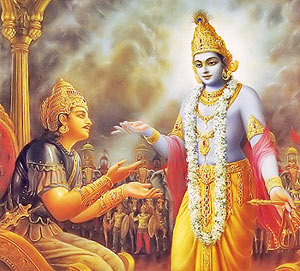 | |
"If you apply Fundamental Discrimination, you would realise that as a Kshatriya, you have no choice but to fight on the side of Dharma." |
There are however situations where two options present themselves and both of which appear to be one’s duty. Both have their pros and cons. Which one to choose? This is a harder exam, and when one faces such a situation, one is said to be caught in a Dharma Sankatam. Arjuna was caught up in precisely such a dilemma, called a moral dilemma.
As he saw it, it was a crime to kill one’s Guru and one’s dear Grandfather, all in the name of gaining back one’s kingdom that had been illegally grabbed. So Arjuna says, “I prefer not to have this kingdom; I would rather beg than kill my near and dear for the sake of this wretched kingdom.” On the face of it, it is a very powerful, forceful argument, and it is not easy to find any fault with it.
That is where Krishna steps in and teaches him not to apply kindergarten type of analysis to such complex situations but a Ph. D level analysis, if I might say so! It is in these situations that the application of Atma Dharma becomes very essential and I have made some references to it in my earlier talks.
Obviously, I cannot go into the entire business of Atma Dharma here, but refer you for further details to Swami’s many Discourses as also the Krishna-Arjuna Dialogue serial in Heart2Heart. But, coming back to the question I started with, I can now say the following:
- Whenever we seek answers from within, we would hear at least two voices. In all cases where multiple voices are heard, we must realise that only one of these is genuine. This genuine voice is the Voice of the Atma or Conscience if you prefer. All the other voices are that of impostors, posing as the Real Self.
- The Real Self is the Atma. The impostor is the Mind, posing as the Real Self. This means, we must learn to distinguish the Voice of the Atma or Conscience from the voice of the Mind or the Ego.
-
Conscience always speaks with one voice, meaning it would not give multiple options. It would always give only one option that is fully consistent with Atma Dharma. The Ego, False Self, the Mind, call it what you will, would offer multiple choices. It would say, “Hey, try this; it is a good option. If you don’t quite like that, how about this? This also is very good for you, you know! Grab it before it slips out of your hand!” and so on. The Ego is a very clever salesman! Recognising the source that gives the multiple options is important; if one is able to recognise it, one can also avoid it.
 Among the many voices of the mind, conscience speaks with only one
Among the many voices of the mind, conscience speaks with only one - How to dump this Ego? This has to be done by cultivating one’s Buddhi, or true Discrimination. The more the development of the Buddhi, the better is one’s Spiritual Discrimination. Thus improvement of Buddhi should be high on one’s agenda for self-improvement.
- Swami says, Ego is very clever and would claim it offers discrimination; yes, it does help you to discriminate with wonderful cost-benefit analysis and all that. However, at the end of the day, it is all individual discrimination, that is to say, discrimination soaked in selfishness. Buddhi, on the other hand, would help in applying what Swami calls Fundamental Discrimination.
- Swami further cites any number of examples of the application of Fundamental Discrimination. Rama was asked by the Emperor to go into the forest. Many told Rama that there was no need to do so, citing all kinds of legal arguments in support. Rama brushed them all saying that Fundamental Discrimination called for Him to stand by Dharma and not the so-called right to the kingdom. Krishna told the same to Arjuna, “If you apply Fundamental Discrimination, you would realise that as a Kshatriya, you have no choice but to fight on the side of Dharma. Your side is the side of Dharma and that is why I am with you! That being the case, how can you refuse to fight?” Next consider Prahalada; the Vedas declare that one must worship father as God. However, there is fine print, which Hiranyakashyapu, the father forgot, but the five-year old Prahalada did not. That is why he told Hiranyakahyapu, “Yes, you are my bodily father for which I give you due respect. However, how can I accept you as the Supreme Lord when I know for sure that it is Narayana who is really the Supreme One?”
And thus we arrive at the following important conclusion: “Sorry, being selfish is quite contrary to the objective of Self-realisation.” That is the short answer to the question we started with. I hope with all the elaborate explanation I have given, the answer is clear.
When one realises one’s True Self or Real Nature or Real Self – call it what you will – it means one recognises in one’s Heart that one is not the body nor the Mind, but really the Atma.
By its very nature, the Atma cannot be selfish. If one is selfish, then how can one achieve the goal of union with the Atma or God? Can oil ever mix with water? In other words, selfishness and Self-realisation simply cannot go together! Hope that is clear!
Let me now move on to the second question which is:
QUESTION 2: Is it possible to obtain liberation in spite of being an atheist, but good at heart?
ANSWER:
This is an interesting as well as an important question. Basically, it all depends on what exactly the questioner means by the word “atheist”. Traditionally, an atheist is a person who denies the existence of God. That might appear to be a very clear-cut definition, but then what does the atheist precisely mean by the word ‘God’? Further, what, for that matter, do we mean by the word ‘God’? So you see, there are lots of subtleties hiding behind this apparently simple question.
In responding to it, I shall take the Vedantic point of view and by the way, all Swami says is nothing but pure Vedanta! So, I guess I am on safe ground there!
Who is an Atheist
Let me start with what we normally mean when we say that so and so is an atheist; it means that the person concerned denies the existence of God. Yes, an atheist indeed firmly denies God and describes God as an invention of weak people, etc. Many eminent people say that. Yet, you know something? Most of these people are often men of very high integrity, who swear by Truth.
Of course, their understanding of the nuances of Truth or Sathya as we call it, might not be as broad or sweeping as Vedanta teaches and explains. These people might deny the existence of God; however, they do deserve our respect. Why do I say that? For the following reasons: Firstly, because Swami tells that Truth is God.
Hence, if an atheist swears by Truth, at least substantially though not in its entirety as Vedanta mandates, then that person is on the right track and is in fact not denying God totally, though the person himself might not be aware of that! Thus, an atheist who swears by Truth should not be rubbished, as is often done by people who feel strongly about their faith in God.
By the way, it is interesting to hear what Gandhi says about Truth. He says:
That is good advice and worth remembering. Let us get back to the issue of the atheist and liberation. So, what does all the above add up to? Will the atheist achieve liberation or not? Yes or no? I guess that is what our questioner would like to know.
The Non-negotiable Path for a Non-believer
Clearly, no one can answer this question in that sense. My own view, based on the Gita is as follows. When Arjuna asks what happens to the imperfect person, who tries to follow Dharma and all that but does not score a hundred out of a hundred, Krishna replies that all is not lost. It is like slowly moving up in school, from one standard to another. If one does well in one academic year and passes the exam, then the student is promoted to the next higher class – and for this, the person, the student does not have to score 100%; that hardly ever happens; yet, year after year, large numbers of students do get promoted, and in this manner, in due course, they reach the end of the road, which means they graduate from school. The same thing happens in University, in professional colleges and so on.
Essentially this also happens with respect to the spiritual evolution of an individual. Krishna says that based on the merits earned during one’s life, by doing good acts, sticking to Sathya, Dharma and so forth, one is born in the next life in such a situation, where there are good opportunities for further spiritual advancement. Of course, just because one has good opportunities in the next birth, it does not automatically mean that in the next birth the person would improve; on the contrary, the person may slide down; in this sense, life is rather like a snakes and ladders game!
The long and short of it is that a good atheist, if I may call him that, who believes in Truth, is likely to be born next time and placed in a situation where he realises that Truth has a reality beyond Space and Time. This is a fundamental difference between Vedanta and the perception atheists have of Truth. For them, Truth is a concept or value that has meaning within Creation, that is, within Space and Time. Vedanta says, “No, Truth goes all the way to the Creator, who is beyond Space and Time.” Swami describes all this succinctly as follows.
The Salient Hierarchy of Truth
He says: There are three strata associated with what we loosely describe as Truth.
He says: There are three strata associated with what we loosely describe as Truth.
At Level 1, we really have facts; this is Truth with validity over a limited period of time. I mean, suppose I am wearing a white shirt right now, a person seeing me would say, “So and so is wearing a white shirt.” Fine; but suppose he says exactly the same thing tomorrow when I am wearing a blue shirt, then he clearly would be wrong. In Sanskrit, facts which have validity over a limited period of time are described by the word Nijam. History is all about the narration of facts, without distortion and bias of course!
Level 2 is about things that remain true throughout Creation, that is, from the beginning to the end of the Universe. In Vedanta, this is referred to as Sathyam.
Swami says that there is a still higher level, where Truth has meaning beyond Creation. At the exalted level, Truth is referred to as Ritham – this is Level 3.
| |||
The Totem of TRUTH |
So the hierarchy is: Ritham first, Sathyam next and finally, at the bottom of the totem pole, is Nijam.
A fully evolved soul would understand all this and order his life to be in tune with Ritham, in which case, he is OK all the way. An atheist would know nothing about Ritham; in fact he might deny its existence, because to do so would mean accepting Vedanta and that in turn means he would have to accept God, which of course he would not do.
OK, what does it all add up to in terms of this atheist ever being liberated? Putting together all that I have said thus far, I would say the following: In his present birth, and with his disbelief in God, NO! However, his belief in Truth would give him plenty of opportunities in later births to recognise that Truth is not just an abstract concept but represents something Supreme, namely Paramatma, who can incarnate, and who teaches us that Truth is just another name for many things such as Selfless Love, Compassion, Forbearance, and so on.
A true devotee of God would fully understand all that while an atheist would not be able to recognise that Truth or Sathya and Love or Prema are all facets of God; that represents a higher level of evolution. The atheist may be on that road, but is not yet at the destination. With luck, he might reach that destination in later births. I trust that throws some light.
I think it has been a heavy dose and I better stop here! Thanks for being with me and hope you join again for the next session too. God bless, Jai Sai Ram.
(To be Continued...)



